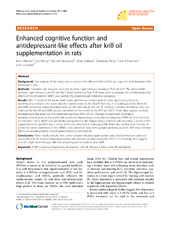| dc.contributor.author | Wibrand, Karin | en_US |
| dc.contributor.author | Berge, Kjetil | en_US |
| dc.contributor.author | Messaoudi, Michaël | en_US |
| dc.contributor.author | Duffaud, Anaïs | en_US |
| dc.contributor.author | Panja, Debabrata | en_US |
| dc.contributor.author | Bramham, Clive R. | en_US |
| dc.contributor.author | Burri, Lena | en_US |
| dc.date.accessioned | 2014-09-16T09:35:44Z | |
| dc.date.available | 2014-09-16T09:35:44Z | |
| dc.date.issued | 2013-01-25 | eng |
| dc.identifier.issn | 1476-511X | |
| dc.identifier.uri | https://hdl.handle.net/1956/8483 | |
| dc.description.abstract | Background: The purpose of the study was to evaluate the effects of krill oil (KO) on cognition and depression-like behaviour in rats. Methods: Cognition was assessed using the Aversive Light Stimulus Avoidance Test (ALSAT). The Unavoidable Aversive Light Stimulus (UALST) and the Forced Swimming Test (FST) were used to evaluate the antidepressant-like effects of KO. Imipramine (IMIP) was used as the antidepressant reference substance. Results: After 7 weeks of KO intake, both males and females treated with KO were significantly better in discriminating between the active and the inactive levers in the ALSAT from day 1 of training (p<0.01). Both KO and IMIP prevented resignation/depression on the third day in the UALST. Similarly, a shorter immobility time was observed for the KO and IMIP groups compared to the control in the FST (p<0.001). These data support a robust antidepressant-like potential and beneficial cognitive effect of KO. Changes in expression of synaptic plasticity-related genes in the prefrontal cortex and hippocampus were also investigated. mRNA for brain-derived neurotrophic factor (Bdnf) was specifically upregulated in the hippocampus of female rats receiving 7 weeks of KO supplementation (p=0.04) and a similar trend was observed in males (p=0.08). Males also exhibited an increase in prefrontal cortex expression of Arc mRNA, a key protein in long-term synaptic plasticity (p=0.05). IMIP induced clear effects on several plasticity related genes including Bdnf and Arc. Conclusions: These results indicate that active components (eicosapentaenoic acid, docosahexaenoic acid and astaxanthin) in KO facilitate learning processes and provide antidepressant-like effects. Our findings also suggest that KO might work through different physiological mechanisms than IMIP. | en_US |
| dc.language.iso | eng | eng |
| dc.publisher | BioMed Central | eng |
| dc.rights | Attribution CC BY | eng |
| dc.rights.uri | http://creativecommons.org/licenses/by/2.0 | eng |
| dc.subject | BDNF | eng |
| dc.subject | Cognition | eng |
| dc.subject | Depression | eng |
| dc.subject | Imipramine | eng |
| dc.subject | Krill oil | eng |
| dc.subject | Omega-3 | eng |
| dc.subject | Fatty acids | eng |
| dc.subject | Phospholipids | eng |
| dc.title | Enhanced cognitive function and antidepressant-like effects after krill oil supplementation in rats | en_US |
| dc.type | Peer reviewed | |
| dc.type | Journal article | |
| dc.date.updated | 2013-08-23T08:55:03Z | |
| dc.description.version | publishedVersion | en_US |
| dc.rights.holder | Copyright 2014 Wibrand et al.; licensee BioMed Central Ltd. | |
| dc.rights.holder | Karin Wibrand et al.; licensee BioMed Central Ltd. | |
| dc.source.articlenumber | 6 | |
| dc.identifier.doi | https://doi.org/10.1186/1476-511x-12-6 | |
| dc.identifier.cristin | 1038448 | |
| dc.source.journal | Lipids in Health and Disease | |
| dc.source.40 | 12 | |

